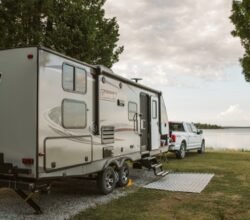- Prepare your camper: Make sure your camper is in good condition and ready for rental. Clean and organize the interior, check all the systems (e.g., electrical, plumbing), and perform any necessary maintenance or repairs.
- Determine your rental terms: Decide on the rental rates, deposit requirements, and any additional fees such as cleaning fees or mileage charges. Consider the rental duration options (daily, weekly, monthly) and whether you’ll offer any discounts for longer rentals.
- Advertise your camper: List your camper for rent on various platforms such as RV rental websites, classified ads, or peer-to-peer rental platforms. Include detailed descriptions, high-quality photos, and all the relevant information potential renters would need to know.
- Create a rental agreement: Develop a rental agreement or contract that outlines the terms and conditions of the rental. Include information about insurance coverage, liability, cancellation policies, and any specific rules or restrictions for the renter.
- Screen potential renters: When receiving inquiries, ask questions to assess the suitability of potential renters. Inquire about their experience with driving and handling campers, their intended trip itinerary, and verify their driver’s license and insurance information.
- Arrange pickup and drop-off: Coordinate with the renters to schedule a time for them to pick up the camper and return it. Provide clear instructions on how to operate the camper’s features and systems, and conduct a thorough walkthrough to document any pre-existing damages.
- Ensure insurance coverage: Confirm whether your current insurance policy covers rentals or if you need to obtain additional coverage for the duration of the rental period. Insurance is crucial to protect yourself and the renter in case of accidents or damages.
- Maintain communication: Stay in touch with the renter during the rental period in case they have any questions or issues. Provide them with a contact number or an emergency contact in case of emergencies.
- Conduct post-rental inspections: Inspect the camper after it’s returned to ensure it’s in the same condition as when it was rented out. Document any damages or issues and discuss them with the renter if necessary.
- Leave reviews: After each rental, consider leaving a review for the renter and ask them to leave feedback for you as well. This can help build your reputation as a reliable camper rental provider.
Remember to consult local laws and regulations regarding camper rentals in your area, as there may be specific requirements or permits you need to obtain.




